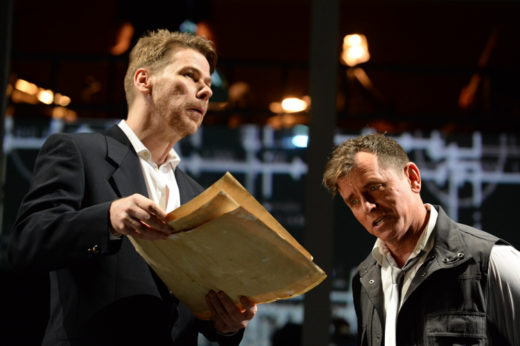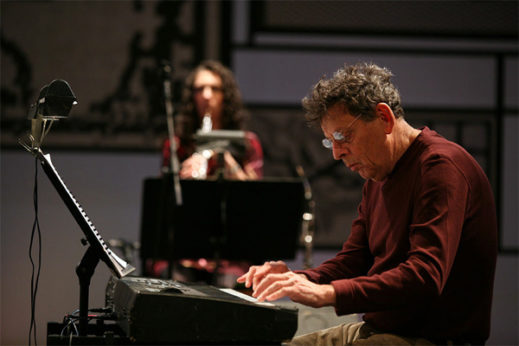
LONG BEACH, Calif.—Two of the world’s most popular and introspective artists have paired up after almost four-score years to create a mesmerizing piece of stage theatre that operagoers will not soon forget. Southern California is currently hosting its premiere performances of Franz Kafka’s short story “In the Penal Colony” adapted as an approximately 90-minute one-act opera by the world-renowned American “minimalist” composer Philip Glass. The libretto is by Rudolph Wurlitzer.
In the Penal Colony premiered in Seattle in the year 2000 in JoAnne Akalaitis’s production, which moved on to Chicago later that year and to New York 2001. It has had occasional other productions abroad, but apparently, until now, not again in the United States.
The provocative Long Beach Opera has shown a long-term interest in Glass’s work, presenting the U.S. premiere of The Perfect American in 2017, Hydrogen Jukebox in 2015, The Fall of the House of Usher in 2013, Akhnaten in 2011, and The Sound of a Voice in 2006. Considered one of the most influential music makers of the late 20th and first part of the 21st centuries, Glass has composed more than 25 operas and a host of other works for full and chamber orchestras, concertos, chamber ensembles and solo instruments. His opera Satyagraha, about Mahatma Gandhi and the freedom struggle in South Africa, has been staged several times, recently in Los Angeles. Opera companies, once hesitant to stage his works because of their nontraditional form and music, have come to respect his work—and its ability to attract the younger hip audiences they covet, who flock to the opera house for their Glass fix. Glass also adapted Kafka’s novel The Trial as an opera.
With penal institutions—many of them run for profit—bursting at the seams in America, the most highly incarcerated nation in the world (655 per 100,000 population, or over 2.2 million), it’s timely for audiences to experience this morally disturbing work. Another way to look at the numbers is to realize that the U.S. has 5% of the world’s population, but 25% of the world’s prisoners. According to notes in the program, “There are more people behind bars today for a drug offense than there were in 1980 for all offenses combined.” In yet another illuminating contrast, the U.S. prison population is half a million more than China’s, with five times as many people.
The opera is cast for two singing soloists. The tenor is The Visitor (Doug Jones), a rapporteur who has been invited to an unnamed tropical island nation to witness an execution. In Kafka’s story the year is about 1907, but given the modern-dress Long Beach production, it could be anywhere, anytime.

The baritone is The Officer (Zeffin Quinn Hollis), who idolizes a unique device invented by the multi-talented late commandant whom he revered, which uses a panel of needles (he calls it a “harrow”) which descend upon the restrained body of the condemned prisoner to ink into his body the words “Honor Thy Superior” in an ornate script with lots of baroque curlicues, and then, at the end of a twelve-hour ordeal kills him with a spike driven through his skull. The Officer theatrically calls this “the performance,” from which “even the least of men is now enlightened.” But he’s upset by the machine’s current state of disrepair and by the growing chorus of criticism of its use, including doubts about it from the island’s current commandant. The Officer believes in its “redemptive powers” and reminisces about the “wonderful times” in the past when masses of people, especially children, were invited to witness the procedure. He hopes The Visitor will speak well of it to the new commandant.
Franz Kafka (1883-1924) is one of the seminal modernist minds whose appeal to contemporary audiences only grows with each passing year. With his strange, unsettling stories of labyrinthian bureaucracy and opaque justice, alienation, physical and psychological brutality, he anticipated later 20th-century genres of science fiction, horror, political terror, and of philosophical movements such as existentialism, absurdism, surrealism and humanism. To his esthetic the word “Kafkaesque” has become a familiar description. In his own day he certainly knew of torture chambers and sadistic jailers in czarist Russia and in the prisons and penal colonies of the Western imperialist countries.
“In der Strafkolonie” (In the Penal Colony) was written in German (Kafka’s first language as a Jew living in Prague) in October 1914, just as the First World War had begun, and revised in November 1918, when the war ended, and the colonial world had been left largely intact. It was first published a century ago, in October 1919.
On its surface the story appears to be about capital punishment in a cruel, authoritarian, nationalistic land, but the two characters’ approach toward it reveals much about the human condition. On the one hand there is the abject sense of worship and servitude by The Officer, almost a medieval Spanish Roman Catholic Inquisitors’ fascination with sadism toward nonbelievers and sinners, and a kind of emancipatory masochism with the idea of suffering as grace. On The Visitor’s part, there is revulsion that such practices are still current in the world, but as a world traveler who has seen many peculiar customs, “It’s always risky interfering in other people’s business,” he muses. “I oppose this procedure, but I will not intervene.” He’s shortly onto a boat off the island and on to his next adventure.
In these two characters Kafka sums up and prefigures the terrible dilemma of humanity, which would reach its apogee in World War II and the Holocaust, to witness the unimaginable and then to decide if and how to act. The “good Germans” who stood by and turned their heads away became the “good French” who cast a blind eye on colonialism in Algeria and Indochina; the “good Portuguese” who only sought to restore the glory of the Age of Exploration by suppressing the natives in Angola, Mozambique and elsewhere; the “good Americans” today who can’t be troubled to lift a finger to stop the massacre the Yemen, who avoid rational conversation about crime and punishment, who can’t even bother to drag themselves to the voting booth.
Extreme torture for vaguely defined crimes such as “insubordination” or “disloyalty” inevitably reminds an audience of beheadings in Saudi Arabia (37 last week of Shi’ite Muslims, some minors), stoning to death legalized by the oil-rich fiefdom of Brunei (for homosexuality or adultery), the tortures of suspects by U.S. military at Abu Ghraib, hangings of Black people in U.S. prisons who were pulled over for a broken tail light, kids in ICE detention, all individuals like those in the opera with no chance to defend themselves. Now there is talk of sending detained migrant children to holding cells at Guantánamo. As The Officer declares, “Guilt is always beyond doubt.”
The LBO production is a collaboration with Cal Rep (California Repertory) Long Beach. “This hybrid performance,” says Jeff Janisheski, Cal Rep’s artistic director and stage director of the opera, “mashes together Glass’s hypnotic opera with a devised theatre piece created from interviews with formerly incarcerated students at Cal State Long Beach. The goal is to listen to the voices that are marginalized, stigmatized and silenced. That is the power of this performance.”
Playwright Juliette Carrillo devised the spoken dialogue by eight prisoners in the colony whom we see on stage throughout. The words come from interviews with members of Rising Scholars, the formerly incarcerated at CSULB and their family members affected by the criminal justice system, mentored by Professor James Binnall. Their observations, complaints and aspirations are of today, but resonate through the centuries with prisoners of all places and times, and with Kafka’s spirit as well: They don’t know why they’re there, what they did, what their sentence is, how long they’ll be in the hole, and why they’re referred to by a number. These alert young actors are Ariana Carter, Isidro Cortes, Mayra De Leon, Kimberly English, Madison Lewis, Matthew Limas, Mark Oliver, and John Pizzini, calling special attention, by their parity of gender, to the predicament of women in prison. Morgan Pimentel plays the slow-moving, lugubrious Guard.
“What fascinates me in this story,” says the composer, “is the moral inversion that takes place. The Officer, having started as all-powerful, becomes the victim, and he takes on the role with a kind of joy. He’s done everything he can to convince the Visitor of the virtue of the Machine, and, when he fails, he realizes it’s over and only The Visitor makes the right judgment, but we can’t admire him because he does this by refusing to be engaged at all. He suffers no inconvenience, whereas we end up warming to the Officer more because he sacrifices everything for his principles.”

“Kafka,” Glass posits, “is suggesting that the mere fact of our human incarnation is enough to make us guilty. One of the attractive things about the story for me as a composer is its formality. The Visitor gets away, but, by avoiding judgment, actually fails. The Officer, in a strange way, redeems himself. It’s a perfectly calibrated outcome, like a trap for a hummingbird.”
The composer’s description of his own music as “a sort of sonic weather that twists, turns, surrounds, develops” applies to In the Penal Colony. The sung dialogue between The Visitor and The Officer is articulate, measured, delivered for the most part with a suppressed emotionality. There aren’t many arias or set pieces as in traditional opera. It comes close to what the Greeks called “melodrama”—not the later meaning of the word, but merely a drama set to be sung. The orchestration is both modest and severe: a string quartet (two violins, viola and cello) plus a bass. Andreas Mitisek, since 2003 the LBO artistic and general director, conducted.
The familiar repetitiveness of Glass’s scores recapitulates in this case the seemingly endless story of torture and injustice. Now, maybe, after seeing this, will we finally do something?!
Danila Korogodsky’s scenic design is a wonder of murderous efficiency which thankfully leaves many details to the imagination. It’s as though we had been witness to the last execution in California (Gov. Gavin Newsom has declared the death penalty inoperative under his watch). As director, Janisheski had the prisoners physically enact the gruesome machine itself, its maws and its claws macerating the supine victim splayed out on the operating table.
At press time, LBO’s production of In The Penal Colony is close to selling out, but some remaining seats are still available for the upcoming performances on May 3, 4, and 5. See the LBO website. The Studio Theatre is located at 7th St. and Campus Drive at the SE corner of the CSULB campus. A map and driving directions can be found here. Campus lots adjacent to the theatre are #6 and #7 or you can park on the street and walk in at 7th St. and Campus Drive. On-campus parking costs $8. It’s a big campus, so do not (as I unfortunately did) use the university’s official address of 1250 N. Bellflower Rd. as your destination.

MOST POPULAR TODAY


Zionist organizations leading campaign to stop ceasefire resolutions in D.C. area

High Court essentially bans demonstrations, freedom of assembly in Deep South

Afghanistan’s socialist years: The promising future killed off by U.S. imperialism

Communist Karol Cariola elected president of Chile’s legislature






Comments